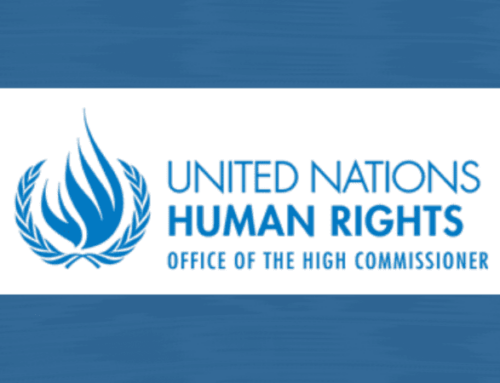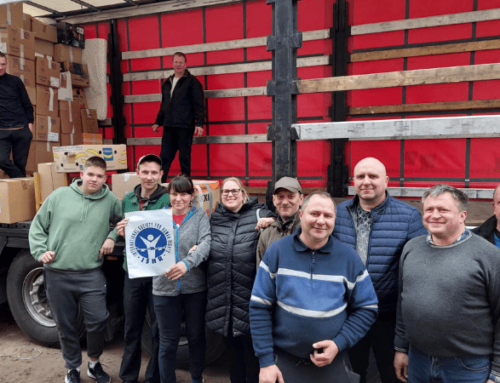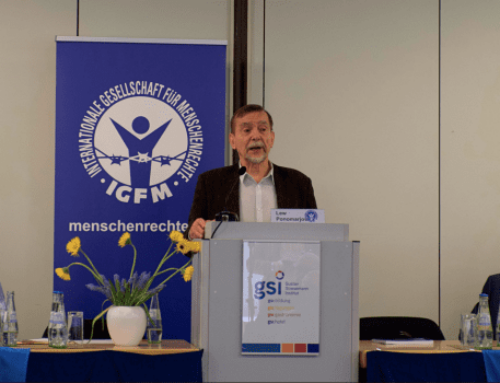Monitoring of the case of I.A. Bliznyuk, A.O. Golovkin, Yu.M. Khlapovsky (hearing of December 2, 2020)

On December 2, 2020, the Ordzhonikidze District Court of Kharkov, continued to consider in open court remotely by videoconference (with broadcast from the Brovary City District Court of the Kiev Region, the State Institution “Kharkov Detention Center” and from the workplace of lawyer A.A. Pryadko) the case on charges of I.A. Bliznyuk, A.O. Golovkin, Yu.M. Khlapovsky. They are charged with Part 1 of Art. 255, Part 3 of Art. 146, Part 4 of Art. 189, Part 1 of Art. 263 of the Criminal Code of Ukraine – creation of a criminal organization, kidnapping, extortion, illegal handling of weapons.
At the beginning of the hearing, the victim A.M. Pokroeva filed a petition to ensure her participation and lawyer A.A. Pryadko in hearings by videoconference from the workplace of her lawyer due to the fact that she is afraid of contracting coronavirus. A.O. Golovkin and Yu.M. Khlapovsky objected to this petition, explaining that the more participants are connected, the more the program slows down. Nevertheless, the court granted the petition and a little later the lawyer got involved.
At this hearing, the court continued to examine the evidence of the prosecution.
The morning before the hearing the prosecutor said that she was ill, but she had all the documents that need to be presented to the court for admission to the evidence and the other prosecutors did not have a physical opportunity to get them.
Also, on December 4, the term of the measure of restraint for the accused expired and it was necessary to decide the expediency of extending the measure of restraint for A.O. Golovkin. and Yu.M. Khlapovsky in the form of detention and I.A. Bliznyuk – in the form of overnight house arrest.
The prosecutor referred to the risks that are provided for in paragraphs 1,3,5 of Art. 177 of the Criminal Procedure Code of Ukraine, namely the risk that the accused will hide from the court, unlawfully influence witnesses or victims, as well as that they may commit another criminal offense, which, in his words, do not decrease, do not cease to exist and in connection with this it is necessary to extend both measures of restraint: Golovkin and Khlapovskiy – detention, Bliznyuk – night house arrest. In response, the judge demanded that the prosecutor justify the above risks. To which the prosecutor replied that A.O. Golovkin, realizing that he had committed an especially grave crime, for which more than 10 years of imprisonment were provided, could hide from the court both within Ukraine and abroad. Regarding the pressure on other participants in the proceeding, he said that this is confirmed by the testimony of victims and witnesses. Since during the commission of the crime, violence was used – the victims are worried about their health, which indicates the existence of risks of the influence of the accused on the victims. He said the same about the other defendants.
According to the defense lawyer of the accused, the prosecutors are extending the terms of detention only for one reason – because of the inability of the prosecution to support the prosecution. He also drew attention to the fact that the hearing was never disrupted because of the defense. As for the risks, he stated that they were unfounded and asked the court to refuse to satisfy the prosecutor’s motion.
The ISHR experts note the existence in the Ukrainian criminal proceedings of a negative trend in the form of automatic prolongation of a measure of restraint in the form of detention, that is, an extension without sufficient grounds, evidence and confirmation by the prosecution of the existence of risks of non-fulfillment by the accused of their procedural obligations. The grounds given in applications for the extension / amendment of a measure of restraint often remain practically similar to each other for a long time and are clearly insufficient to meet the requirements of paragraph 3 of Art. 5 of the Convention (the right to trial within a reasonable time or to release pending trial).
It should be recalled that the European Court of Human Rights in its decisions indicates that the competent domestic authorities are obliged to provide relevant and sufficient reasons for both the appointment and the extension of the period of pretrial detention (“Buzadzhi v. Republic of Moldova”, para. 58).
Also, according to the established case-law of the European Court, the presumption under Article 5 of the Convention speaks in favor of the release of the accused pending trial. As stated in paragraph 4 of the judgment of the European Court in the case “Neumeister v. Austria”, the second part of paragraph 3 of Art. 5 of the Convention does not give the judicial authorities the choice between bringing the accused to trial within a reasonable time or his temporary release pending trial. Until the defendant is convicted, he must be presumed innocent, and the purpose of the Convention provision under consideration is essentially to demand his temporary release from custody as soon as the extension of detention ceases to be reasonable (“Bykov v. Russia”, para. 61).
In the case of I.A. Bliznyuk, A.O. Golovkin, Yu.M. Khlapovsky, the prosecutor once again stated the same risks as before, without substantiating why over time they did not lose their relevance and did not prove their real existence. In addition, a witness took part in the hearing via video link, who expressed his opinion on the prosecutor’s motion, fully supporting the opinion of the defense.
A.O. Golovkin, once again drew the court’s attention to the fact that for three years none of the risks from the prosecutor’s request to extend the measure of restraint had changed. Yu.M. Khlapovsky and I.A. Bliznyuk also supported him.
The court announced a decision on the issue of extending measures of restraint for each of the accused on December 03, 2020. Based on the texts of the definitions, the prosecutor’s requests were satisfied and the duration of the measures of restraint was extended until 02/01/2021.
The next hearing is scheduled for December 8, 2020. The International Society for Human Rights will continue to clarify the details of this proceeding.








Leave A Comment